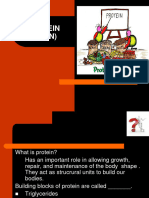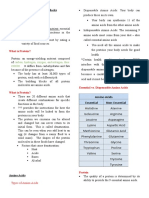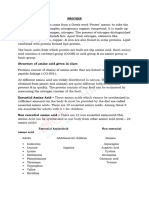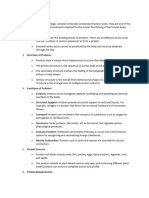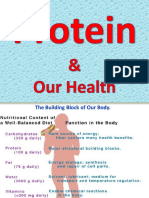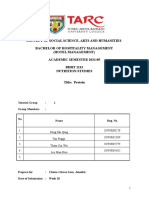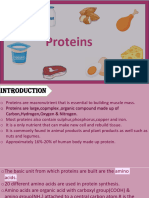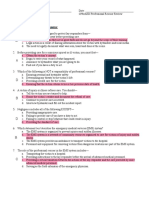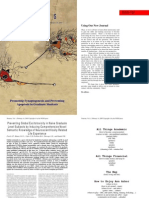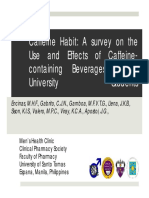Protein Project:
By: Kamilla, Lara, Eduarda and Bernardo
1. Does your nutrient provide energy?
- Protein is typically not the primary source of energy for the body. But in
situations where calorie intake from other nutrients or stored fat is
insufficient, protein may be broken down into ketone bodies, which can
then be utilized for energy. If so, 4 calories per gram
2. What cells and tissues is your nutrient important for developing/growing?
- Protein is an important nutrient that provides essential amino acids that helps
children grow and develop properly. Protein is a part of every cell in the body and
helps to build and repair muscle, tissue, skin, nails and hair. Protein also helps to
build hormones, enzymes and a healthy immune system.
- Muscles: Protein is a key player in building and repairing muscle tissue. It's
especially important during periods of growth, such as childhood and adolescence.
- Skin: Proteins contribute to the structure and elasticity of the skin. Collagen, a
protein, is particularly essential for maintaining skin health.
- Nails and Hair: Proteins, especially keratin, are vital for the strength and structure of
nails and hair. A protein-rich diet supports healthy and vibrant hair and nails.
- Tissues: Protein is a fundamental component of various tissues throughout the
body, supporting their structure and function.
- Immune System: Proteins contribute to the immune system by forming antibodies
that help defend the body against infections and illnesses.
3. What functions of the body does your nutrient help regulate?
- It drives metabolic reactions, maintains pH and fluid balance, and keeps the
immune system strong.
- Enzymatic Activity: Many enzymes, which catalyze biochemical reactions,
are proteins. These reactions are essential for processes such as digestion,
metabolism, and energy production.
- Hormonal Regulation: Proteins contribute to the production of hormones
that regulate numerous physiological processes, including growth,
metabolism, and stress responses.
- Immune Response: Antibodies, which are proteins, play a central role in the
immune system by recognizing and neutralizing foreign substances such as
bacteria and viruses.
4. What are the recommended daily values suggestions for your nutrient based on
a 200 calories diet?
- Anywhere from 10% to 35% of your calories should be from protein. So, if
your needs are 2000 calories that’s 200-700 calories from proteins.
�5. What foods are high in your nutrient?
Lean meats – beef, lamb, veal, pork, kangaroo
Poultry – chicken, turkey, duck, emu, goose, bush birds
Fish and seafood – fish, prawns, crab, lobster, mussels, oysters, scallops, clams
eggs
Dairy products – milk, yoghurt (especially Greek yoghurt), cheese (especially
cottage cheese)
Nuts (including nut pastes) and seeds – almonds, pine nuts, walnuts,
macadamias, hazelnuts, cashews, pumpkin seeds, sesame seeds, sunflower
seeds.
Legumes and beans – all beans, lentils, chickpeas, split peas, tofu.
6. Building blocks of protein:
- The building blocks of proteins are amino acids. Amino acids are
organic compounds composed of carbon, hydrogen, oxygen,
nitrogen, and sometimes sulfur. There are 20 different amino acids
that can combine in various ways to form a protein. These amino
acids can be classified into two main types: essential amino acids
and non-essential amino acids.
Essential Amino Acids: These are amino acids that the body cannot produce
on its own, so they must be obtained through the diet. There are nine essential
amino acids: histidine, isoleucine, leucine, lysine, methionine, phenylalanine,
threonine, tryptophan, and valine.
Non-Essential Amino Acids: The body can synthesize these amino acids, so
they do not need to be obtained directly from the diet. There are 11 non-essential
amino acids: alanine, arginine, asparagine, aspartic acid, cysteine, glutamine,
glutamic acid, glycine, proline, serine, and tyrosine.

